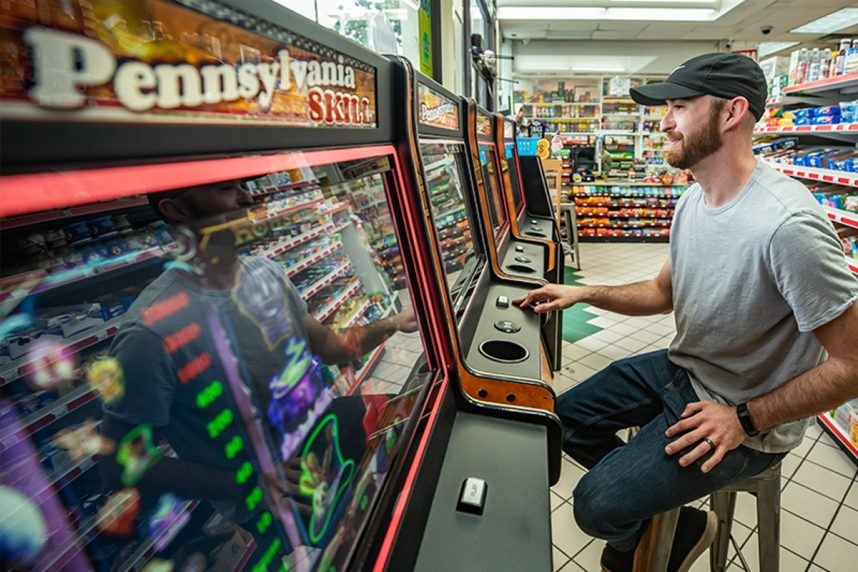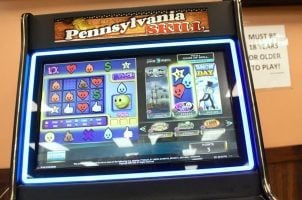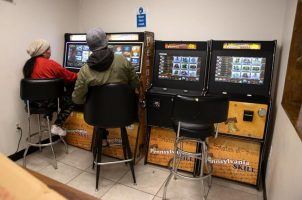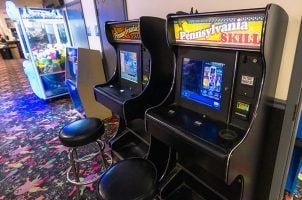Pennsylvania Skill Game Developer Says Terminals Don’t Compete With Casino Slots
Posted on: June 30, 2024, 09:58h.
Last updated on: July 1, 2024, 10:11h.
The company behind Pennsylvania Skill games, the slot-like machines that occupy much floor space in restaurants and bars, convenience stores, gas stations, retail shopping centers, and grocery markets, says its gaming devices don’t directly compete with casino slot machines.

The state commercial gaming industry, consisting of 17 brick-and-mortar casinos, iGaming, retail and online sports betting, fantasy sports, and video gaming terminals, reported its best May ever with gross gaming revenue (GGR) of nearly $521 million. Pace-O-Matic (POM), the Georgia-based software company that developed the operating system of the Pennsylvania Skill games, issued a press release congratulating the casinos on their May to remember while defending its games.
These numbers show that there is room in the state for both casinos and small businesses that operate skill games to be successful. There is no competition between the two,” declared Mike Barley, a POM spokesperson.
The legality of skill games in Pennsylvania will soon be reviewed by the state’s Supreme Court. State Attorney General Michelle Henry is appealing lower court rulings that since the games have elements of skill, they cannot be classified as illegal gambling machines under the state’s Gaming Act.
Casino Industry Disagrees
Barley’s assertion that skill games aren’t competing for the same player certainly isn’t an opinion shared by the casinos.
Representatives with Parx, the richest casino in the state, said last week that they wouldn’t move forward with building a $100 million hotel until the skill game legal saga has played out. Parx in the meantime is acquiring an adjacent smaller hotel to offer patrons onsite lodging.
Barley says the casinos are simply being greedy.
Sadly, $521 million a month is not enough to satisfy the greedy casino industry,” Barley stated. “Instead, they want to kill small businesses, American Legions, volunteer fire companies, Moose Lodges, and other places that count on income from skill games.”
Skill games are unregulated and untaxed, though POM and other skill gaming proponents have asked state lawmakers to pass legislation to create a regulatory environment for the machines. The revenue is currently split between the host business, gaming developer, manufacturer, and route distributor.
Legislation stalled in the Harrisburg capital amid the skill gaming legal dispute proposed levying a 16% tax on skill games’ gross revenue. Gov. Josh Shapiro (D) has suggested a much higher rate of 42%.
Barley says a low tax is critical in allowing the machines to continue providing valuable financial resources to small businesses that have helped offset inflation.
“These locations could never afford to pay the same tax rate that wealthy casinos pay. Casinos know that but they simply don’t care,” Barley said.
Skill Game Legality
In late November, Pennsylvania’s Commonwealth Court unanimously upheld a lower court’s ruling that concluded skill games aren’t gambling games. The court said chance must be the predominating factor in a game’s outcome rather than skill for a game to be a gambling activity.
Simply because a machine involves a large element of chance … is insufficient to find the machine to be a gambling device,” Dauphin County Judge Andrew Dowling wrote.
Henry disagrees and is asking the state Supreme Court to reconsider and classify skill games as illegal gambling machines.
Related News Articles
Pennsylvania Skill Games Ruling Appealed to State Supreme Court
Most Popular
FTC: Casino Resort Fees Must Be Included in Upfront Hotel Rates
Genovese Capo Sentenced for Illegal Gambling on Long Island
NBA Referees Expose Sports Betting Abuse Following Steve Kerr Meltdown
UPDATE: Former Resorts World & MGM Grand Prez Loses Gaming License
Most Commented
-
UPDATE: Whiskey Pete’s Casino Near Las Vegas Closes
— December 20, 2024 — 30 Comments -
Caesars Virginia in Danville Now Accepting Hotel Room Reservations
— November 27, 2024 — 9 Comments -
UPDATE: Former Resorts World & MGM Grand Prez Loses Gaming License
— December 19, 2024 — 8 Comments -
FTC: Casino Resort Fees Must Be Included in Upfront Hotel Rates
— December 17, 2024 — 7 Comments
















Last Comments ( 4 )
Here is how the profits from Pennsylvania skill machines are split up. After-tax profits from the machines are divided like this: 40 percent to the establishment; 40 percent to the operator, who leases the games; and 20 percent to the distributor, or the game’s maker. Now you know. Comment here accordingly and launch this article to the top of the "Most Commented" list. Accomplish that and it will remain there for months. More readers will then post more comments.
Sadly, Mike Barley had convinced small businesses, American Legions, volunteer fire companies, Moose Lodges, and other places that unauthorized gambling in Pennsylvania was a way for them to make money. The fact that these organizations and businesses have come to rely on this money, doesn't change the fact that it is unauthorized. They should all blame Mike Barley if the Supreme Court determines that unauthorized gambling is in fact illegal.
Of course Pace-O-Matic (POM) says that. They are counting on and hoping that every decision-maker has already forgotten about what the Pennsylvania Gaming Control Board reported at their regularly scheduled meeting in November 2022. The PGCB representative from the Office of Enforcement Council stated then that skill games have been brought up by each casino that has requested approval for slot reductions, and that their effect on casino revenues “appears to be an issue.” Go back and check.
Video Poker is both a skill-based game and a game of chance. Each variant game has it's own strategy to be able to attain the best possible outcome. Someone skilled in playing Jacks or Better Poker may not know the strategy for playing Double Double Bonus Poker and to get the full rewards for each game you must know the strategy behind it. Strategy guides and software to help people improve their skills are readily available. These games are all considered gambling.